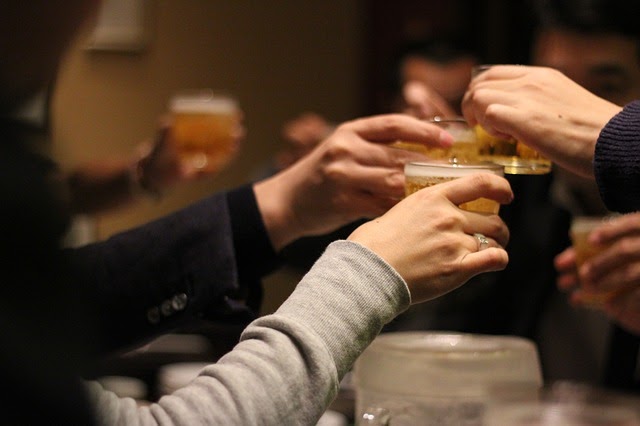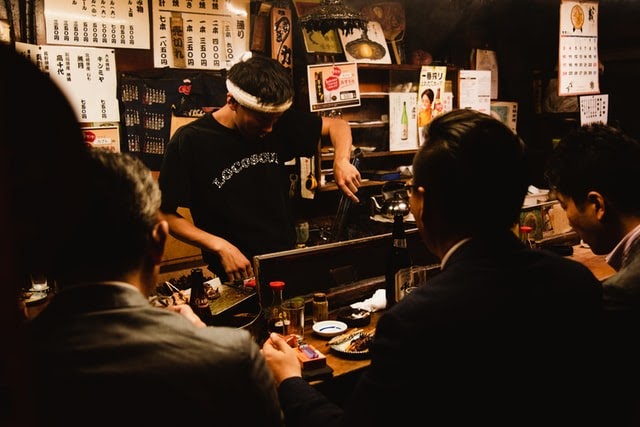- Life & Culture
Drinking Culture in Japan – Social and Business Etiquette
Japanese Drinking Culture
Japanese drinking habits are a little different than they are in the west. Before you take a tipple with the locals, you need to know some of the social customs.
For the most part, Japanese culture is very reserved; discipline and respect are highly regarded traits.
Drinking is an important part of Japanese work and social culture because it helps break down the firm appearances that come as a product of this culture.
Japanese people see drinking as a way to share a sense of togetherness and honesty. In fact, drinking with colleagues (Nomikai) in Japan can be important for your work relationships.
Keep reading these tips to help you fit in with Japan’s colourful drinking culture.
Japanese drinking etiquette
Never pour a drink for yourself
The first rule is to never pour a drink for yourself.
In Japan, your friends, colleagues or host should pour your drinks for you, and you should make sure their glasses are full too!
Don’t drink before everyone has their drink
Just like with food in the west, it’s polite to not start drinking until everyone has been served. Make sure you wait until everyone is ready to start drinking before you do.
Have food with your drinks
Japanese people rarely go out for just a drink, it’s customary to have a meal or a snack with your drinks.
Light snacks, also known as “otsumami”, are the Japanese equivalent of western bar snacks like nuts. On the otsumami menu, you will find light snacks like edamame, shredded squid and rice crackers.
Read our separate blog on dining etiquette in Japan for more tips about eating Japanese food.

Kanpai! Means cheers in Japanese
“Kanpai” is the Japanese equivalent to “cheers”. It originates from drinking sake, and it literally translates to “dry cup”. Which is the same as saying “bottoms up” or “finish your drink”. You don’t really have to finish your drink though.
Otsukaresana deshita
“Otsukaresana deshita” is a more sophisticated way to say Kanpai.
When you say this to someone you are saying “you are tired and you deserve a drink”.
Hard workers are held in high regard in Japan, and unlike the west, calling someone tired is a compliment.
When do I say kanpai or otsukaresana deshita?
Similar to the west, Japanese people traditionally say cheers on the first round of drinks.
Everyone will usually order the same drink, which is normally beer or sake. It will be beer more often than not.

What is nommunication (Nomikai)? After work drinks
Also known as nomikai and nominication, nommunication means drinking alcohol to help spark conversation between colleagues.
The word is derived from the Japanese verb nomu (飲む), which means “to drink” and communication. Hence, Nommunication.
Why is nommunication so popular in Japan?
Nommunication is popular for a few reasons. In Japan, the social structure is strict. People generally like to be viewed as serious, hard-working and reserved.
Organisations see drinking together as beneficial because it helps colleagues let down their barriers and build stronger relationships with each other and clients.
When colleagues feel more relaxed, they are more likely to address their concerns and voice their opinions to each other and their superiors. This openness is seen as constructive, and many believe it helps organisations grow. But, be careful to not get too relaxed and offend anyone!
“If you are a problem drinker, you will likely get worse in Japan. Alcohol is cheap, it’s available everywhere, and the social mores against drinking are weaker than in the west. It’s unfortunate, but I’ve seen a number of people come to Japan and fall into heavy drinking.
If you develop a drinking problem in Japan, there are less resources available to help with recovery than in other countries. AA is not common, and the number of specialized hospitals for alcohol abuse is very few.” – Recruiter at Interac
In many organisations, nommunication is considered good working practice, and it can be seen as offensive if you don’t attend work social events.
In fact, it can be important for your career. Many Japanese people believe they will miss out on career development opportunities if they don’t attend nommunication events with work.
Popular nommunication events
Here are six nomikai events to note down in your calendar.
Bounenkani
Bounenkai is a drinking party that takes place at the end of the year. The word Bounenkai translates to “forget the year party”. It is held to celebrate the achievements of the previous year and to welcome the next year with good intentions.
Settai
Settai means “business entertainment” and these occasions are quite formal. They usually involve eating at restaurants with clients or potential clients. The aim of a settai is usually to start, build or maintain a business relationship.
Joshikai
A joshikai is an all-female gathering in Japan. Work, relationships and hobbies are the main topics of a joshikai. For women working in Japan, they can be a great way to strengthen relationships at work.
Kangeikai
A kangeikai is a “joyful welcome party” specifically for new teachers in Japan. These nomikai events usually consist of a nice dinner at a restaurant with drinks and a speech.
Soubetsukai
A Soubetsukai is a farewell party specifically for teachers and professors leaving their job at an educational institution.
Just like a kangeikai, these events usually involve drinks over dinner and a speech. So, if you’re working as an English teacher in Japan, you might attend one of these if you decide to go home.

Japan’s national drink is sake, but beer is more popular
Read below about some popular alcoholic Japanese drinks.
What is sake?
Sake, otherwise known as “nihonshu” is synonymous with Japanese drinking culture. It is a rice wine that is typically enjoyed with an appetiser or a tapas style meal called izakaya. It goes well with sushi too.
It’s a common belief that sake can make your meal more enjoyable and memorable. The different flavours complement your food and enhance the flavours.
Japanese beer
Beer is the drink of choice for most people in Japan. Popular brands include Kirin, Sapporo, Suntory and Asahi. Many of these beer brands are available in the west too. You may have even tried some of them?
Whisky is up and coming in Japan
Whisky is a popular drink of choice for Japanese men. In recent years, Japanese whisky has become increasingly popular all over the world. So, if you’re a whisky drinker, you’ll be able to try the fine Japanese whisky without seeing the heavy import costs like when you buy it in the west.
Shochu
Another traditional drink in Japan is shochu. It’s a bit stronger than Sake but definitely worth a try. Similar to vodka, it is a distilled liquor, but it’s usually made from rice. Its flavours are descried as nutty or earthy, and it’s usually served on ice with hot, or cold water or with fresh juice.
Chuhai
If you like sweet beverages, chuhai is a popular fruity alcoholic drink. It’s made from shochu (sometimes vodka) mixed traditionally flavoured with lemon (lemon sour) and carbonated water. Other flavours including lime, grapefruit, apple and orange are also available.
Umeshu
Umeshu is another popular fruit drink you might like to try. It’s a sweet Japanese plum wine most commonly consumed on ice. Some people believe it is good for your health too.
Happoshu
Happoshu is a popular beer-like drink in Japan. It has lower malt content than regular beer, which means it’s not technically beer. This means the tax is lower on it and, in turn, the prices are cheaper than beer. Many people believe it does not taste as good as real beer, but they like the prices.
Alcohol in vending machines
As you may know, vending machines are very popular in Japan. You can find lots of drinks including beer, cocktails and even hot and cold sake in Japanese vending machines!

Are you ready to go for a drink in Japan?
Apart from a few pleasantries, drinking in Japan isn’t all that different from anywhere else in the world.
Now you know some popular drinks and basic social etiquette, go out and enjoy yourself! And, If you’re ever feeling homesick, or in need of a little western culture, there are lots of British-style pubs you can visit too. You can even check out our guide to going out in Tokyo for inspiration!
If you’re looking for an English-speaking job in Japan, contact our friendly team.
About the Author

Brian McDonough is a consultant at Interac, Japan’s largest provider of ALTs (Assistant Language Teachers). Originally from the US, Brian has lived in Japan for over 25 years, giving him a unique perspective on the cultural differences and challenges people face when moving to Japan. He has first-hand experience of working in Japan as an American.





